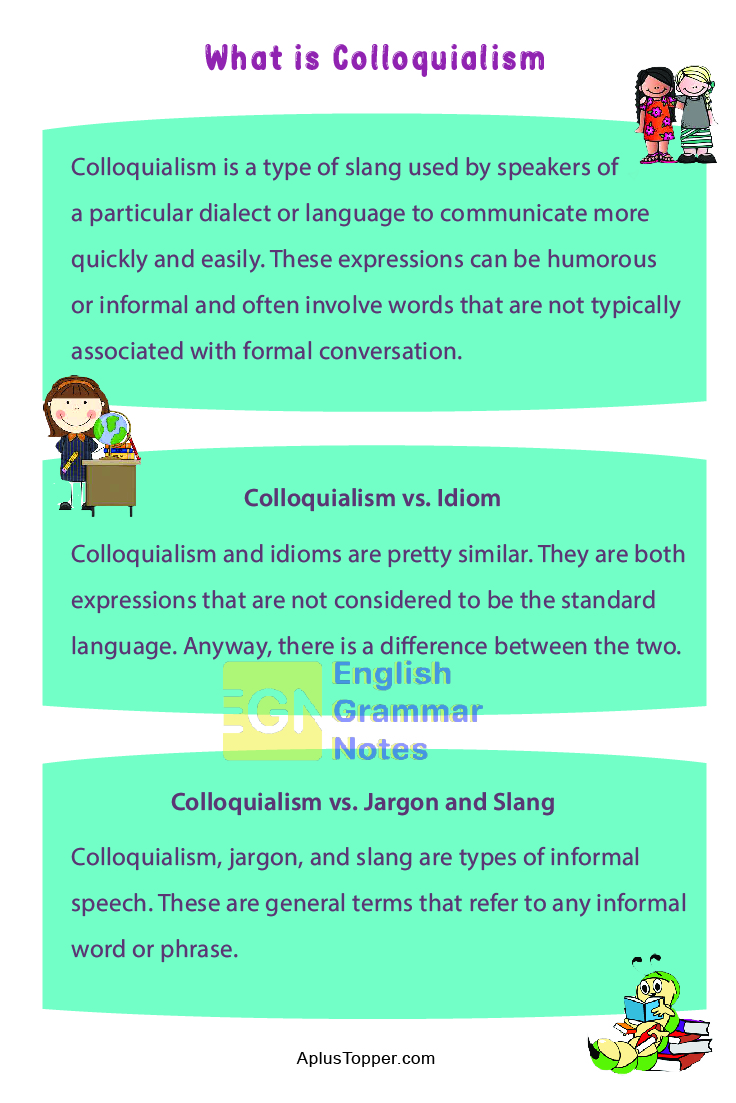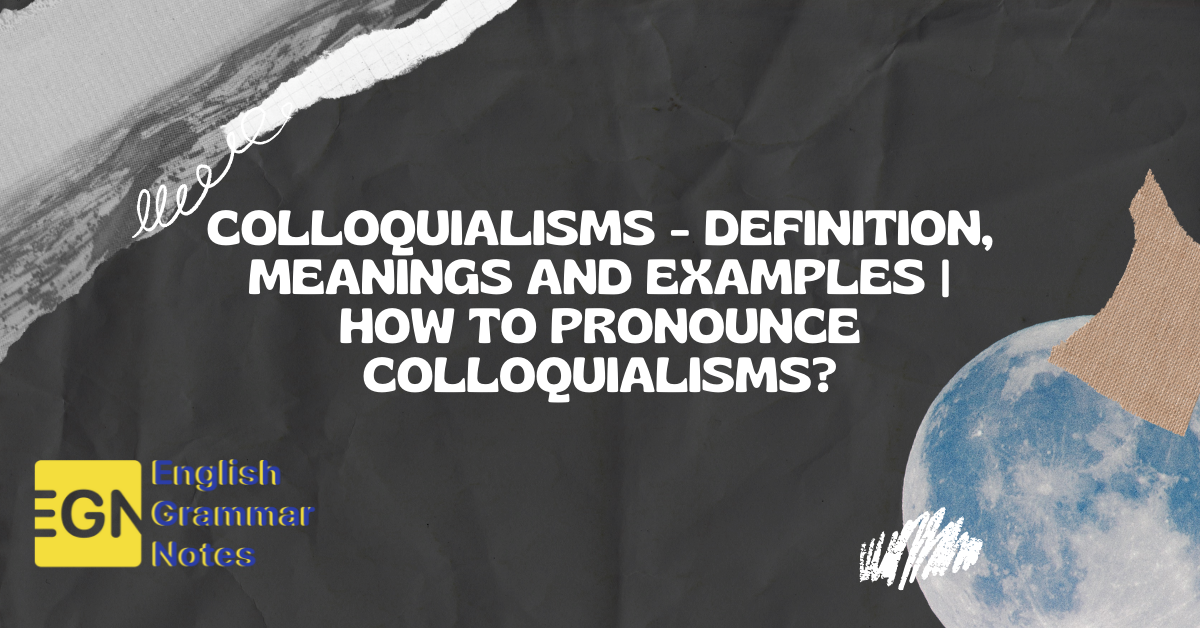Do you ever face a situation where someone is communicating with you in English and you will understand the words but do not know the meaning? Those particular words we call colloquialisms. In our daily conversations, we use many colloquialisms. Some of these expressions are unique to a specific region or culture, while others have become part of the English language.
In this article, we are going to tell you everything about Colloquialisms like what is it, examples, meanings, and many more.
- What is Colloquialism in English Language?
- Examples of Colloquialism
- Meanings of English Colloquialisms Used in Other Countries
- Colloquialism vs. Idiom
- Colloquialism vs. Jargon and Slang
- Why Do Writers use Colloquialism in Literature?
- Why do other words function as colloquialisms?
- What is the difference between colloquialism and euphemism?
- What is the importance of colloquial words and phrases?
What is Colloquialism in English Language?
Colloquialism is a type of slang used by speakers of a particular dialect or language to communicate more quickly and easily. These expressions can be humorous or informal and often involve words that are not typically associated with formal conversation. Most dictionaries define colloquialism as words or phrases that are informal, fancy, and everyday language. So, as a literary device, these also help you in making your language sound more realistic.
Examples of Colloquialism
Some words and phrases have taken on a life of their own, becoming part of the vernacular. Sometimes these expressions are used more commonly by one group of people than another, but regardless of who uses them, they are considered colloquialisms. We use colloquialisms in three different ways they are words, phrases, and aphorisms.
Here are some examples of colloquialism.
In words:
Contractions like “gonna“, y’all” and “ain’t,”.
In Phrases:
- “Kick the bucket” = to die
- “Elbow grease” = hard work
- “Hard to swallow” = difficult to believe
In Aphorisms:
- “All that glitters isn’t gold.”
- “When it rains, it pours.”
Meanings of English Colloquialisms Used in Other Countries
Colloquialisms in the English language have some unique meanings in other countries. Every country has different types of usage. Here we are going to provide you with some Canadian, Australian American, and British English colloquialisms that you can use in your everyday language if you want to sound casual.
- Ride shotgun – to sit in the front passenger seat of a car
- Pencil crayons – colored pencils
- Bludger – a lazy person
- Furphy – unlikely stories or rumors
- Deadset – something that is true
- Click – a kilometer
- Chirping – making fun of or taunting someone
- Lemon – a purchase that is unreliable and has many problems
- Pencil crayons – colored pencils
- Tosh – something that’s untrue
Check out our English Grammar Notes website for more grammar points for students from beginner to advanced levels. And it is free to download.
Colloquialism vs. Idiom
Colloquialism and idioms are pretty similar. They are both expressions that are not considered to be the standard language. Anyway, there is a difference between the two. Colloquialism refers to the words and phrases that are used in everyday conversation. On the other hand, idiom refers to a phrase with a specific meaning that differs from the individual words within it.
For example, the phrase “break a leg” is an idiom that means good luck. The individual words “break,” “leg,” and “good” all have different meanings, but when they are put together, they create a new meaning. Idioms can be difficult to understand if you don’t know their meaning. This is why it is essential to learn as many idioms as possible.
Colloquialism vs. Jargon and Slang
Colloquialism, jargon, and slang are types of informal speech. These are general terms that refer to any informal word or phrase. Jargon is a specialized language used by professionals in a particular field. Slang is a type of informal language specific to a particular group or culture. Colloquialisms, jargon, and slang can be difficult to understand for people who are not familiar with them.
They can also be confusing because they vary from region to region and from one era to another. However, they can be fun to use and add color and flavor to our conversations. Colloquialisms are very region-specific; a phrase that is popular in America and is widely used does not mean that the exact phrase will have the same context and meaning in the UK. Jargons are more technical than slang and colloquialisms.

Related Articles:
Why Do Writers use Colloquialism in Literature?
Writers tend to use colloquialism if they want to add depth to their characters. Characters speaking everyday language and phrases seem more accurate than other characters. The readers can associate themselves with the character and relate to them. Writers also use colloquialisms as a clever way of depicting the region and country of the person or the character without actually revealing these details.
It is also fun for the audience to decipher that information independently. The writers want the conversation of their characters to feel more natural and for them to have a good flow. So to accomplish this, they use colloquialisms. It also helps them to convert more meaning using fewer words.
Frequently Asked Questions on Colloquialism
1. Why do other words function as colloquialisms?
There are several reasons why other words function as colloquialisms. One reason is that they are unique to a particular geographical region. For example, in the United States, “throwing down the gauntlet” is a common expression, but it would not make much sense to someone in the United Kingdom.
2. What is the difference between colloquialism and euphemism?
A colloquialism is a word or phrase used in informal speech but not in formal writing. Euphemism is a type of colloquialism that is not limited to informal speech. A euphemism is a polite or mild way of saying something that might be considered rude or offensive.
3. What is the importance of colloquial words and phrases?
Many words and phrases we use in our everyday conversations do not have a precise meaning. These words and phrases are called colloquialisms. These are often used in place of more precise terms because they are easier to say and they communicate the idea more clearly.
For example, instead of saying, “I would like to purchase a ticket,” you might say, “Can I buy a ticket?” This is a colloquialism. It is shorter and more accessible to say than the more formal phrase.
Wrapping up
Hope that the information we have added about colloquialisms is helpful for you to learn how to use colloquialisms in your everyday life. These are essential and fun parts of the English language. They add color and personality to our conversations and can be a great way to show off our regional dialects. If you have any doubts about this concept you can comment to us in the comment section. Bookmark our site to know more updates on Literary devices.
